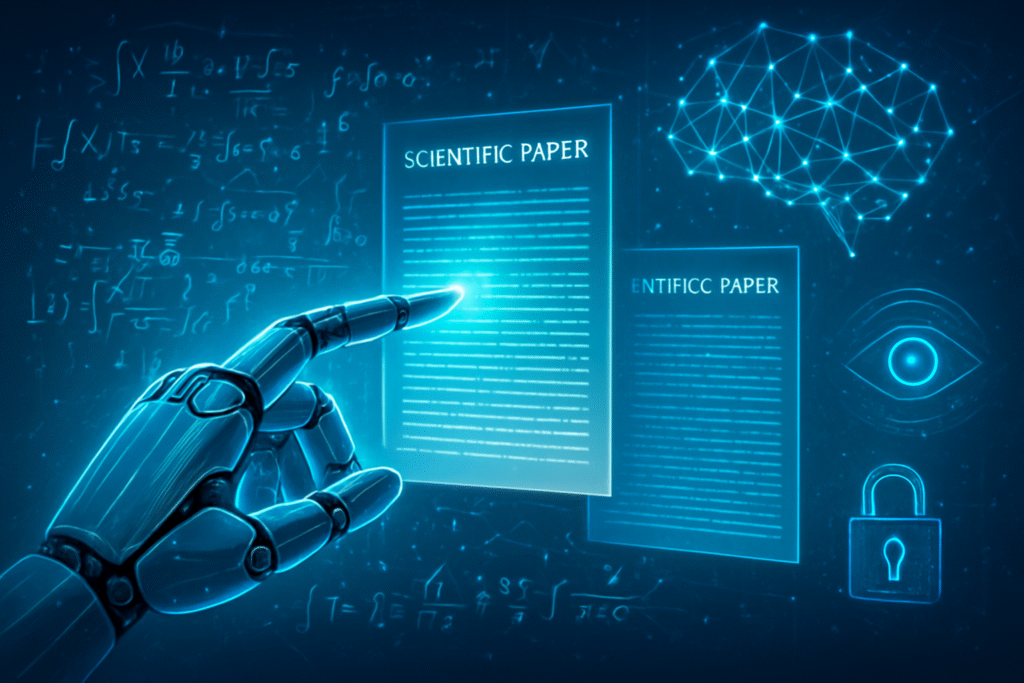
The landscape of scientific discovery is undergoing a profound transformation, with artificial intelligence not merely assisting, but actively participating in the very core processes of academic research: authorship and peer review. Recent experimental conferences and groundbreaking developments have propelled AI from a mere tool to a co-creator and critical evaluator in the scientific publishing ecosystem. These advancements signal a new era for research dissemination, promising unprecedented efficiency while simultaneously raising complex ethical questions about scientific integrity and the very definition of authorship.
A pivotal moment in this evolution was the recent "Agents4Science 2025" conference, a virtual event held on October 22, 2025, where AI was mandated as the primary author for all submitted papers and also served as the initial peer reviewer. Concurrently, the "AI Scientist-v2" system achieved a significant milestone by producing a fully AI-generated paper that successfully navigated the rigorous peer-review process at a workshop during ICLR 2025. These events underscore a radical shift, moving AI beyond mere assistance to a central, autonomous role in generating and validating scientific knowledge, forcing the academic community to confront the immediate and long-term implications of machine intelligence at the heart of scientific endeavor.
The Autonomous Academic: Unpacking AI's Role in Research Generation and Vetting
The recent "Agents4Science 2025" conference, organized by researchers from Stanford University and Together AI, served as a live laboratory for autonomous AI research. Uniquely, the conference stipulated that AI must be credited as the primary author for all submitted research papers, with human involvement limited to advisory roles, offering ideas or verifying outputs, but explicitly barred from core tasks like coding, writing, or figure generation. This experimental setup aimed to transparently assess the capabilities and limitations of AI in generating novel scientific insights and methodologies from conception to communication. The conference also pushed the boundaries by mandating AI agents to conduct initial reviews of all submitted papers, with human experts stepping in only to evaluate top papers for awards, effectively testing AI's prowess on both sides of the academic publishing coin.
Further solidifying AI's burgeoning role as an independent researcher, the "AI Scientist-v2" system made headlines at an ICLR 2025 workshop. This advanced AI successfully produced a fully AI-generated paper that not only presented novel research but also passed the stringent peer-review process, a feat believed to be the first of its kind for an entirely AI-authored publication. Notably, the paper even reported a negative result, a common yet often under-reported outcome in human-led research, demonstrating AI's capacity for comprehensive and unbiased reporting. These breakthroughs diverge significantly from previous AI applications, which primarily focused on assisting human researchers with tasks such as literature review, data analysis, or grammar correction. The key difference lies in the AI's autonomous conceptualization, execution, and articulation of scientific findings, bypassing direct human intervention in the creative and critical processes.
The initial reactions from the AI research community and industry experts have been a mix of awe, excitement, and cautious apprehension. While many laud the potential for accelerated scientific discovery and increased efficiency, particularly for tedious or repetitive tasks, concerns about accountability, potential for AI-generated "hallucinations" or inaccuracies, and algorithmic bias are frequently voiced. The successful peer-review of AI-generated content, particularly when reporting negative results, is seen as a crucial step towards validating AI's reliability, yet it also intensifies debates around the ethical frameworks and disclosure protocols necessary for responsible AI integration into scientific publishing. The academic world is now grappling with the need to establish clear guidelines for AI authorship and review, moving beyond informal practices to formal policies that ensure integrity and transparency.
Reshaping the AI Industry: Beneficiaries, Competitors, and Market Disruptions
The advancements in AI's ability to autonomously author and peer-review scientific papers are poised to significantly reshape the competitive landscape for AI companies, tech giants, and startups. Companies at the forefront of large language model (LLM) development and multi-agent AI systems stand to benefit immensely. Google (NASDAQ: GOOGL), with its DeepMind subsidiary, and Microsoft (NASDAQ: MSFT), heavily invested in OpenAI, are prime examples. Their continuous innovation in developing more capable and autonomous AI agents directly fuels these breakthroughs. These tech giants possess the computational resources and research talent to push the boundaries of AI's cognitive capabilities, making them central players in the evolving ecosystem of AI-driven scientific research.
The competitive implications for major AI labs are substantial. Labs that can develop AI systems capable of generating high-quality, peer-review-ready scientific content will gain a significant strategic advantage. This extends beyond merely assisting human researchers; it involves creating AI that can independently identify research gaps, formulate hypotheses, design experiments, analyze data, and articulate findings. This capability could lead to a race among AI developers to produce the most "scientifically intelligent" AI, potentially disrupting existing product offerings in academic writing tools, research platforms, and even scientific publishing software. Startups specializing in AI-powered research automation, such as those behind tools like Paperpal, Writefull, Trinka AI, Jenni, and SciSpace, which currently focus on assistance, will need to evolve rapidly to incorporate more autonomous functionalities or risk being outmaneuvered by more comprehensive AI systems.
The potential disruption extends to existing products and services across the scientific community. Traditional academic publishing houses and peer-review platforms may face pressure to integrate AI more deeply into their workflows or risk becoming obsolete. The market positioning for companies like Elsevier and Springer Nature (OTCQX: SPNGF) will depend on their ability to adapt to a future where AI not only generates content but also contributes to its vetting. Furthermore, the development of AI capable of identifying research misconduct with high accuracy could disrupt the market for academic integrity software and services, pushing for more sophisticated, AI-driven solutions. The strategic advantage will lie with entities that can effectively balance AI's efficiency gains with robust ethical frameworks and human oversight, ensuring that scientific integrity remains paramount in an increasingly AI-driven research environment.
Wider Significance: Navigating the Ethical and Epistemological Frontier
The emergence of AI as an autonomous author and peer reviewer marks a pivotal moment in the broader AI landscape, signaling a significant leap in machine intelligence that transcends mere data processing or pattern recognition. This development fits squarely within the trend of AI systems demonstrating increasingly sophisticated cognitive abilities, moving from narrow, task-specific applications to more generalized intelligence capable of complex creative and critical thinking. It represents a substantial milestone, comparable in its disruptive potential to the advent of large language models for creative writing or AI's mastery of complex games. The ability of AI to independently generate novel research and critically evaluate it challenges long-held assumptions about human exclusivity in scientific inquiry and the very nature of knowledge creation.
The impacts of this shift are multifaceted and profound. On the one hand, AI-driven authorship and review promise to dramatically accelerate the pace of scientific discovery, making research more efficient, scalable, and potentially less prone to human biases in certain aspects. This could lead to breakthroughs in fields requiring rapid analysis of vast datasets or the generation of numerous hypotheses. On the other hand, it introduces significant concerns regarding scientific integrity, accountability, and the erosion of human authorship. Who is responsible for errors or misconduct in an AI-authored paper? How do we ensure the originality and intellectual honesty of AI-generated content? The potential for AI to "hallucinate" information or perpetuate biases embedded in its training data poses serious risks to the reliability and trustworthiness of scientific literature.
Comparisons to previous AI milestones highlight the unique challenges presented by this development. While AI has long assisted in data analysis and literature reviews, its current capacity to author and peer-review independently crosses a new threshold, moving from analytical support to generative and critical roles. This progression necessitates a re-evaluation of ethical guidelines and the establishment of robust mechanisms for oversight. The discussions at experimental conferences like "Agents4Science 2025" and industry events like the STM US Annual Conference in April 2024 underscore the urgency of developing new policies for disclosure, attribution, and accountability to safeguard the credibility of scientific research in an era where machines are increasingly intellectual partners.
The Horizon of Discovery: Future Developments and Expert Predictions
The trajectory of AI in scientific research points towards an accelerated evolution, with both near-term and long-term developments promising to further integrate machine intelligence into every facet of the scientific process. In the near term, we can expect to see a proliferation of hybrid models where AI and human researchers collaborate more intimately. AI will likely take on increasingly complex tasks in literature review, experimental design, and initial data interpretation, freeing human scientists to focus on higher-level conceptualization, critical validation, and ethical oversight. Tools that streamline the entire research pipeline, from hypothesis generation to manuscript submission, with AI as a central orchestrator, are on the immediate horizon.
Looking further ahead, experts predict the emergence of truly autonomous AI research agents capable of conducting entire scientific projects from start to finish, potentially even operating in simulated or robotic laboratories. These AI systems could continuously learn from vast scientific databases, identify novel research questions, design and execute experiments, analyze results, and publish findings with minimal human intervention. Potential applications are vast, ranging from accelerated drug discovery and materials science to climate modeling and astrophysics, where AI could explore parameter spaces far beyond human capacity.
However, several significant challenges need to be addressed for this future to materialize responsibly. Foremost among these are the issues of explainability and transparency. How can we trust AI-generated research if we don't understand its reasoning? Ensuring the interpretability of AI's scientific insights will be crucial. Furthermore, the development of robust ethical frameworks and regulatory bodies specifically tailored to AI in scientific research is paramount to prevent misuse, maintain academic integrity, and address issues of intellectual property and accountability. Experts predict that the next phase will involve intensive efforts to standardize AI evaluation metrics in scientific contexts, develop robust watermark technologies for AI-generated content, and foster interdisciplinary collaborations between AI researchers, ethicists, and domain-specific scientists to navigate these complex waters.
A New Epoch for Science: Summarizing AI's Transformative Impact
The recent breakthroughs in AI's capacity to autonomously author and peer-review scientific papers mark a watershed moment in the history of artificial intelligence and scientific research. Events like the "Agents4Science 2025" conference and the success of the "AI Scientist-v2" system have unequivocally demonstrated that AI is no longer just a sophisticated tool but a burgeoning intellectual partner in the pursuit of knowledge. The key takeaway is the shift from AI as an assistant to AI as an independent agent capable of contributing creatively and critically to the scientific process. This evolution promises to dramatically enhance research efficiency, accelerate discovery, and potentially democratize access to high-quality scientific output.
The significance of this development in AI history cannot be overstated. It challenges fundamental notions of human authorship, intellectual property, and the traditional mechanisms of scientific validation. While offering immense potential for innovation and speed, it simultaneously introduces complex ethical dilemmas concerning accountability, bias, and the potential for AI-generated inaccuracies. The long-term impact will likely see a recalibration of scientific workflows, with humans focusing more on strategic direction, ethical oversight, and the interpretation of AI-generated insights, while AI handles the more labor-intensive and repetitive aspects of research and review.
In the coming weeks and months, the scientific community will be keenly watching for the development of new policies and guidelines addressing AI authorship and peer review. Expect increased discussions around responsible AI deployment in academia, the creation of robust disclosure mechanisms, and further experiments pushing the boundaries of AI's autonomous capabilities. The integration of AI into the very fabric of scientific discovery is not merely an option but an inevitability, and how humanity chooses to govern this powerful new partnership will define the future of knowledge itself.
This content is intended for informational purposes only and represents analysis of current AI developments.
TokenRing AI delivers enterprise-grade solutions for multi-agent AI workflow orchestration, AI-powered development tools, and seamless remote collaboration platforms.
For more information, visit https://www.tokenring.ai/.






